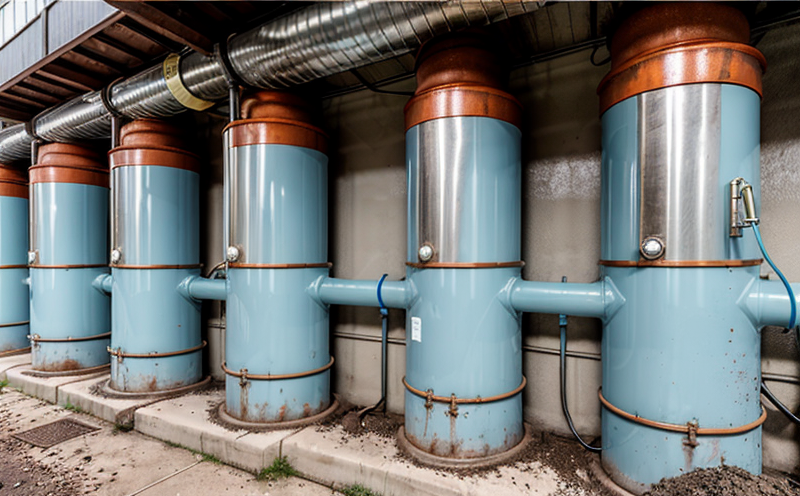ASTM D513 Carbonate and Bicarbonate Test in Water
The ASTM D513 Standard Practice is a critical method used to determine the carbonate and bicarbonate content of water samples. This test plays an important role in ensuring water quality, particularly for industries such as power generation, oil & gas, chemical processing, and pharmaceuticals where water treatment processes are essential.
Carbamate and bicarbonate levels are crucial indicators of a water's buffering capacity, which influences its corrosivity and potential to form scale or deposits. This test is especially important in high-pressure systems such as those used for steam generation or cooling tower operations, where even small changes in pH can lead to significant operational issues.
The ASTM D513 method involves titration with a strong acid to neutralize the bicarbonate and carbonate ions present in the sample. The endpoint is determined using phenolphthalein as an indicator for the detection of carbonate ion and bromcresol green for the bicarbonate ion. This technique provides precise measurements that help in optimizing water treatment processes, reducing operational costs, and ensuring compliance with regulatory standards.
The test results are essential for quality managers to make informed decisions regarding water treatment strategies. By accurately measuring these ions, they can adjust chemical treatments like pH adjustment or scale inhibitors effectively. This ensures not only the longevity of equipment but also minimizes the environmental impact by reducing wastewater discharge containing harmful chemicals.
For compliance officers, ASTM D513 is a key tool to ensure that water systems are operating within specified limits set by local, national, and international regulations. In industries like power generation, where boiler feedwater quality directly affects boiler life and efficiency, this test provides critical data needed for regulatory compliance.
R&D engineers can use the results from ASTM D513 to innovate and develop new water treatment technologies that are more efficient and environmentally friendly. The insights gained from this test help in formulating better scaling inhibitors or corrosion prevention additives that can be tailored specifically for different water types.
In summary, ASTMs D513 is a fundamental method for assessing carbonate and bicarbonate levels in water systems. Its accuracy and reliability make it indispensable for maintaining high-quality water in various industrial applications.
Customer Impact and Satisfaction
- Improved Water Quality: Our ASTM D513 testing ensures that water used in critical processes is free from harmful levels of carbonate and bicarbonate, thereby enhancing product quality and safety.
- Cost Efficiency: By optimizing chemical treatments based on accurate test results, customers can reduce unnecessary waste and minimize operational costs.
- Enhanced Equipment Lifespan: Effective water treatment strategies recommended through ASTM D513 testing help extend the life of equipment, reducing downtime and maintenance expenses.
- Regulatory Compliance: Our service helps customers stay compliant with stringent regulations governing water quality in various industries.
We consistently receive positive feedback from our clients for providing timely and accurate results that contribute to their operational excellence. Our team of experts ensures that every test is conducted rigorously following ASTM D513 standards, thereby building long-term trust and satisfaction with our services.
Environmental and Sustainability Contributions
The ASTM D513 Carbonate and Bicarbonate Test in Water contributes significantly to environmental sustainability by promoting efficient water usage and minimizing waste. By accurately measuring carbonate and bicarbonate levels, we help clients implement targeted water treatment strategies that reduce the amount of chemicals used in processes.
Through precise control over water chemistry, our service enables industries to prevent harmful scale formation and corrosion, which can lead to leaks or failures that would otherwise increase energy consumption and water usage. This not only improves operational efficiency but also decreases the environmental footprint by reducing the discharge of contaminated water into natural ecosystems.
In addition, the insights gained from ASTM D513 testing allow for better management of water resources, leading to more sustainable practices overall. By ensuring that water is used efficiently and effectively in industrial processes, we support a more responsible approach to resource management, which aligns with global sustainability goals.
Competitive Advantage and Market Impact
The ASTM D513 Carbonate and Bicarbonate Test provides a competitive advantage by enabling precise control over water quality in critical industrial processes. This precision is particularly valuable for industries that rely heavily on steam generation, oil & gas operations, chemical processing, and pharmaceutical production.
By ensuring optimal carbonate and bicarbonate levels, our service helps clients achieve superior product quality while minimizing operational costs. For example, power generation companies can reduce the need for costly repairs by extending equipment life through effective water treatment strategies. This not only enhances operational efficiency but also contributes to a more sustainable business model.
In oil & gas operations, maintaining accurate carbonate and bicarbonate levels is essential for optimizing steam injection processes in enhanced oil recovery (EOR) methods. By doing so, companies can improve production yields while minimizing environmental impact. Similarly, chemical processing plants benefit from precise water quality management that ensures the stability of reaction conditions.
The ASTM D513 test also plays a crucial role in maintaining compliance with stringent regulatory standards across various industries. This not only helps clients avoid penalties but also enhances their reputation as environmentally responsible entities. By staying ahead of compliance requirements, our service contributes to a competitive edge that is increasingly valued by consumers and stakeholders alike.
In summary, the ASTM D513 Carbonate and Bicarbonate Test in Water offers a significant competitive advantage by providing accurate, reliable data that supports efficient water management practices. This leads to enhanced product quality, reduced operational costs, extended equipment life, and better compliance with regulatory standards, all of which contribute to long-term sustainability and profitability.





